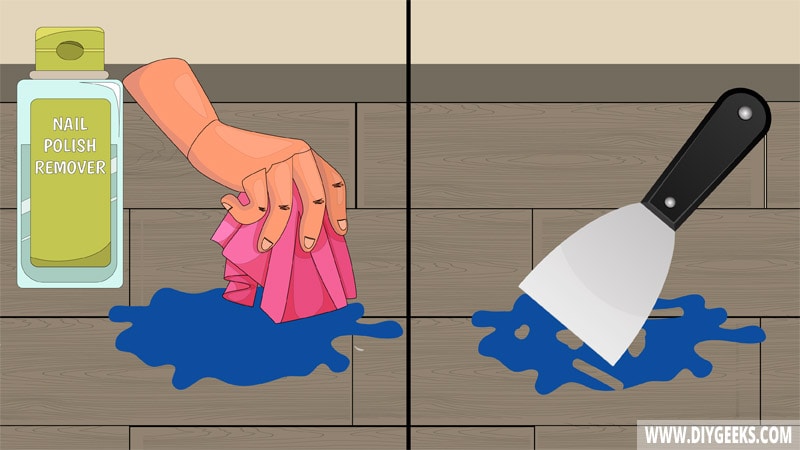Have you ever found yourself staring at a stubborn stain on your vinyl floor, wondering if a quick solution like acetone could be the magic bullet? It’s a common thought – we all want a quick fix, especially when it comes to cleaning. But before you grab that bottle of nail polish remover and start scrubbing, let’s delve into the world of vinyl flooring and acetone to find out if they’re a match made in cleaning heaven or a recipe for disaster.

Image: www.diygeeks.com
Vinyl flooring is a versatile and durable choice for many homes, but its popularity comes with questions. Is it really okay to use acetone, a powerful solvent, on this common flooring material? The answer is far from straightforward, and it depends on various factors that we’ll explore in detail. We’ll separate fact from fiction, examine the risks and rewards, and ultimately empower you with the knowledge to make an informed decision for your home.
Unveiling the Chemistry: Why Acetone Might Be a Risky Choice
Acetone, the key ingredient in most nail polish removers, is a powerful solvent that excels at dissolving a wide range of substances, including resins, polymers, and oils. This makes it a go-to for cleaning sticky residues, but it’s also where the danger lies for vinyl flooring. Vinyl flooring, despite its durability, is made from a complex blend of synthetic materials, and these materials can be susceptible to the dissolving power of acetone.
Imagine a delicate puzzle; a strong solvent like acetone is like a hand pushing and pulling at the puzzle pieces, potentially dislodging them. In the case of vinyl flooring, this “dislodging” could lead to a range of issues:
- Dulling and Discoloration: Acetone’s dissolving power can strip away the protective coating on the vinyl floor, leaving it dull, discolored, and prone to future damage. The vibrant finish that once enhanced your space could be a distant memory.
- Damage to the Vinyl Layers: Vinyl flooring is typically made up of multiple layers, each serving a specific purpose. Acetone can weaken or damage these layers, leading to premature wear and tear, and even cracks or tears in the flooring.
- Chemical Reactions: The interaction between acetone and the chemicals within the vinyl could trigger unpredictable reactions, potentially causing discoloration, warping, or even the release of harmful fumes into the air.
The Complicated Truth: When Acetone Could Be a Solution
While the potential dangers of acetone are substantial, there might be limited instances where it could be used on vinyl flooring. It’s crucial to exercise extreme caution and to understand the context:
- Vinyl Tiles: If you’re dealing with loose vinyl tiles (not glued down), acetone might work on stubborn stains on the tile’s surface, especially if the stain is oil-based. However, always test acetone on a hidden area of the tile first before applying it to the entire surface.
- Specific Vinyl Floor Types: Some vinyl floors are designed for high-traffic areas and have a more resistant finish. If you have one of these, you might be able to use a diluted solution of acetone (always diluted with water) on a small area to test its impact.
Safety First: Protecting You and Your Home
Even if you’re considering using acetone on your vinyl floor, safety should always be your top priority. Here’s a checklist to keep in mind:
- Test a Hidden Area: Before using any cleaning solution on your vinyl flooring, especially something strong like acetone, test it on a small, hidden area to see how it reacts. This will help you assess the potential damage and identify any potential adverse reactions.
- Ventilation is Key: Always use acetone in a well-ventilated area, preferably outdoors. This helps prevent the buildup of fumes that can irritate your eyes, nose, and throat.
- Protect Yourself: Wear gloves and eye protection when handling acetone. It’s a potent chemical and contact with skin or eyes can cause irritation or even more serious problems.
- Dilute When Possible: If you decide to use acetone on your vinyl flooring, always dilute it with water to minimize the risk of damage. Never use undiluted acetone directly on your floor.

Image: allnailart.com
Expert Advice: Safe and Effective Alternatives
Instead of risking the damage that acetone could cause, there are safer, more effective ways to clean and maintain your vinyl flooring:
- Warm Soapy Water: This is often the best solution for daily cleaning. Use warm water and a mild dish soap to wash away dirt and grime, then rinse thoroughly.
- Vinegar Solution: Vinegar is a natural cleaning agent that effectively cuts through grease and grime. Mix a solution of equal parts water and white vinegar, use a soft cloth or mop to apply it to the floor, and let it air dry.
- Baking Soda Paste: For tough stains, create a paste from baking soda and water, apply it to the stain, let it sit for a few minutes, and then scrub with a soft brush. Rinse thoroughly with water.
- Commercial Vinyl Floor Cleaners: There are countless commercial cleaning products specifically designed for vinyl flooring. These products are formulated to clean effectively while protecting the finish of your floor.
Can You Use Acetone On Vinyl Floor
The Final Word: Choose Safety and Longevity
While the allure of a fast solution might be tempting, it’s crucial to remember that vinyl flooring is an investment. Using acetone on your vinyl floor can jeopardize its beauty and lifespan. Instead, embrace safer cleaning methods that will not only keep your floors looking their best but also protect their longevity. You’ll be rewarded with a clean, vibrant home, and your floors will thank you for it.
As you embark on your flooring cleaning journey, remember that taking a little extra time to explore safer alternatives will always be worth it. You’ll be able to enjoy your beautiful vinyl flooring for years to come.






